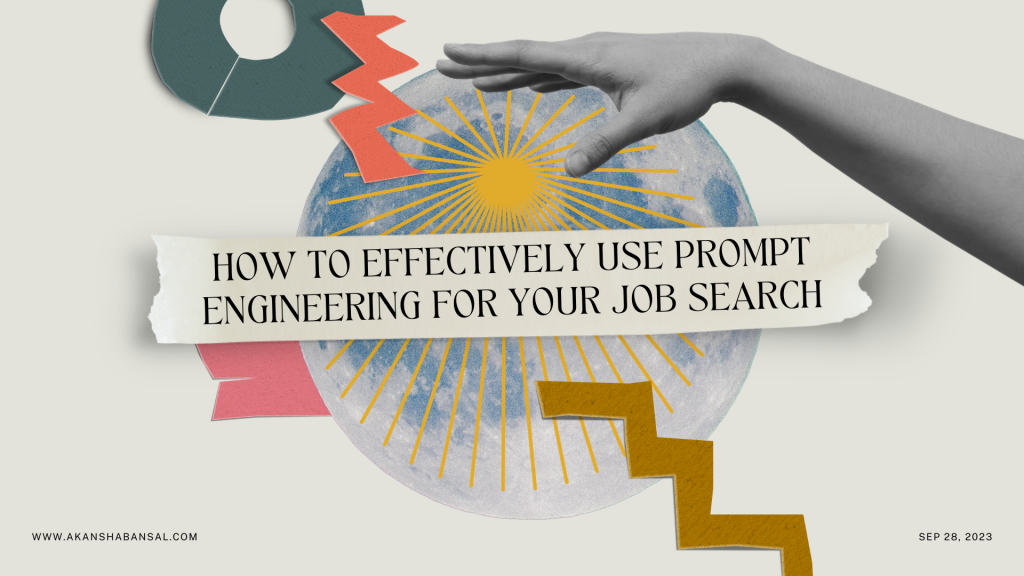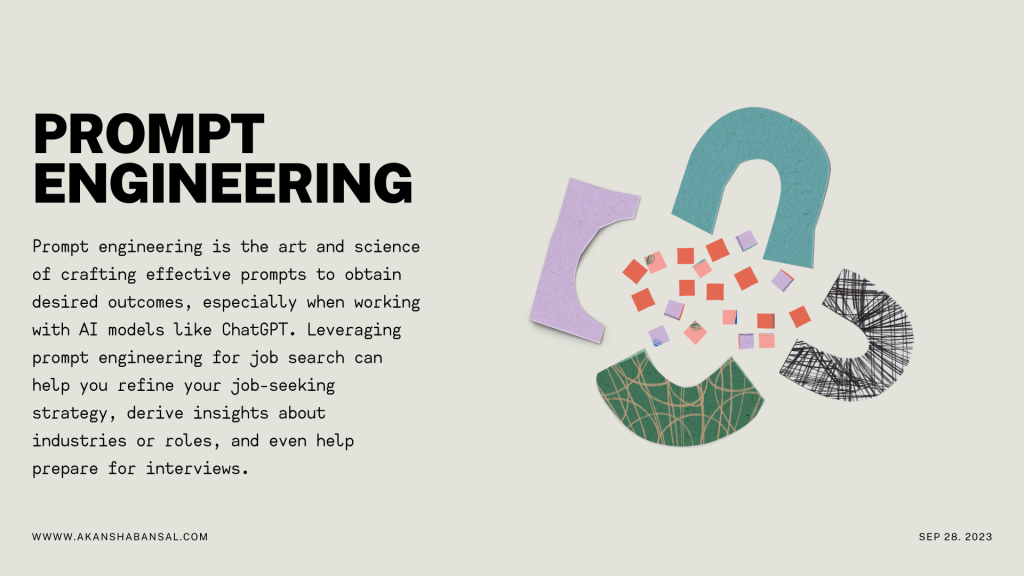
Prompt engineering is the art and science of crafting effective prompts to obtain desired outcomes, especially when working with AI models like ChatGPT. Leveraging prompt engineering for job search can help you refine your job-seeking strategy, derive insights about industries or roles, and even help prepare for interviews.
- Résumé Review: Create a prompt asking the AI to evaluate and suggest improvements for your résumé. E.g., “Review the following résumé for a software engineer position and suggest three areas of improvement.”
- Cover Letter Assistance: Provide a draft of your cover letter and ask the AI for feedback or enhancements.
- Role Understanding: Craft a prompt to gain insights about a specific job role. E.g., “Describe the day-to-day responsibilities of a digital marketing specialist in the e-commerce industry.”
- Company Research: Before interviews or applying, gain knowledge about specific companies. “Provide recent accomplishments of Company XYZ in the renewable energy sector.”
- Interview Questions Prediction: Ask the AI about potential interview questions for a specific role. “List possible interview questions for a project manager role at a tech startup.”
- Salary Benchmarking: Seek guidance on salary expectations. “What’s the average salary for a data scientist with 5 years of experience in New York?”
- Networking Suggestions: Request tips for networking in a particular industry or role. “Provide strategies for networking with professionals in the financial sector.”
- Skill Gap Identification: Ask the AI about the top skills required for a specific role and compare them with your skill set. “List the top 10 skills required for a frontend developer in 2023.”
- Interview Preparation: Simulate interview scenarios. “Pretend you’re an interviewer for a UX designer position. Ask me questions and evaluate my responses.”
- Job Board Scraper Assistance: Craft a prompt to help identify key job boards or websites where roles in your field are commonly posted.
- Trend Identification: Identify emerging trends or roles in your industry. “What are the emerging roles in the biotechnology sector in the next 5 years?”
- Personal Branding Tips: Ask for advice on how to brand yourself online, on platforms like LinkedIn or personal websites.
- Negotiation Strategies: Seek insights on how to negotiate job offers, benefits, or salary. “Provide a strategy for negotiating a higher starting salary for a managerial role.”
- Feedback Loop: After every interview or application, ask the AI to help you reflect on what went well and what could be improved.
- Tailored Job Search Strategy: “Design a 30-day job search strategy for a mid-level graphic designer looking for opportunities in the advertising sec

Harness the Power of AI for a Killer Job Search
Looking for a new job can feel overwhelming and time-consuming. Now with the rise of AI tools like ChatGPT and Claude, you can supercharge your job search and stand out from the applicant crowd. These advanced conversational AIs can help at every stage when leveraged creatively.
Craft the Perfect Resume
Ask ChatGPT to generate a first draft of your resume based on your career background and target role. Refine the draft further with Claude by providing your full work history and skills. Claude can rewrite your resume to be concise, compelling and ATS-friendly.
Research Companies
Use ChatGPT to research target companies you want to apply to – ask for info about the company mission, culture, tech stack, important projects, etc. Get a solid overview before hitting the job sites.Prepare for Interviews Have mock interviews with ChatGPT or Claude. Ask them challenging technical and behavioral questions and practice responding confidently. Get feedback to continuously improve.
Craft Cover Letters Describe the role and company you’re applying to and have ChatGPT generate a customized cover letter draft highlighting your fit. Refine it and make it more personal with Claude.
Build Your Portfolio Ask ChatGPT for ideas on data analysis, visualizations, projects etc. you can add to your portfolio based on skills needed for the roles you want. Bring the best ideas to life.
Network Intelligently
Use ChatGPT to research people at your target company on LinkedIn. Craft personalized, insightful messages to connect with key insiders.
Stay Up to Date
Have Claude summarize the latest news, research and trends in your target industry. Use these insights to impress interviewers and demonstrate passion.
Utilizing ChatGPT for a job search requires crafting specific prompts that can help yield actionable insights, suggestions, and information. Here are some of the best prompts to use:
- Résumé and Cover Letter:
- “Can you review and suggest improvements for the following résumé targeting a software engineer position?”
- “Help me draft a compelling opening paragraph for a cover letter for a marketing manager role.”
- Understanding Roles:
- “Describe the typical responsibilities and skills of a data analyst in the healthcare sector.”
- “What are the differences between a product manager and a project manager?”
- Interview Preparation:
- “Provide potential behavioral interview questions I might face for a business analyst role.”
- “How should I answer the question, ‘Why did you leave your last job?'”
- Salary Information and Negotiation:
- “What’s the average salary for a UX designer with 3 years of experience in San Francisco?”
- “Provide tips on negotiating a job offer for a senior executive position.”
- Networking:
- “What are effective strategies for networking in the finance industry?”
- “How can I introduce myself to someone in my industry on LinkedIn without coming off as too forward?”
- Skill Enhancement:
- “List essential skills for an entry-level position in bioinformatics.”
- “Recommend online courses or resources to learn machine learning for beginners.”
- Company Research:
- “What can you tell me about the culture and values of Google up to 2022?”
- “List the major competitors of Salesforce in the CRM space as of 2022.”
- Job Search Strategy:
- “Design a weekly job search plan for someone in the digital marketing field.”
- “What are the most effective job boards for remote tech jobs?”
- Career Guidance:
- “What are the typical career progression paths for someone in human resources?”
- “I have a background in physics; what industries or roles might be a good fit if I want to transition out of academia?”
- Feedback and Reflection:
- “I had a job interview and was asked these questions [list questions]. How could I improve my answers for next time?”
- “Based on this feedback I received from a recruiter [provide feedback], what steps should I take for improvement?”
The key is using these tools strategically at each step of the process to create stand-out application materials, prep thoroughly and expand your knowledge. With AI assistance, you can put your best foot forward in the job hunt! What other ways have you used AI in your job search? Let me know in the comments.
In conclusion, prompt engineering represents an important development in AI technology that will only continue to expand in impact. Though nascent, tools like GPT-3 point to the vast potential of using neural networks to generate human-like text for a wide variety of applications. However, risks around misinformation and responsible implementation will require extensive research and ingenuity to address. If harnessed carefully, prompt engineering could enable more natural human-AI interactions and automation across industries. But this emerging capability also raises critical ethical and regulatory questions that society will grapple with in coming years. By maintaining realistic expectations of its limits alongside the optimism, prompt engineering can hopefully fulfill its promise of augmenting human capabilities through language.
The key aspects covered in this conclusion are:
- Recapping prompt engineering’s current state and future outlook
- Underscoring the significant potential applications if harnessed responsibly
- Reiterating key risks and challenges that require ongoing research
- Stressing the need for ethical, realistic oversight as the technology matures
- Conveying qualified optimism that prompt engineering can enhance human-AI collaboration